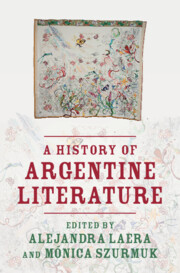Book contents
- A History of Argentine Literature
- A History of Argentine Literature
- Copyright page
- Contents
- Figures
- Contributors
- Editors’ Acknowledgments
- Introduction
- Part I Literary Dates
- Part II Critical Inroads
- Part III Literary Names
- Chapter 21 Sarmiento: Politics, Culture, and Spectacle
- Chapter 22 The Mansilla Siblings: A Story in Syntony
- Chapter 23 Martín Fierro: Subaltern Voices
- Chapter 24 Borges and Argentine Literature: A Detour around the World
- Chapter 25 Roberto Arlt
- Chapter 26 The Ocampo Sisters
- Chapter 27 Alfonsina Storni and Alejandra Pizarnik
- Chapter 28 Displacement and Transfer in Julio Cortázar’s Todos los fuegos el fuego
- Chapter 29 Manuel Puig’s Circuit Bending: Literary Listening against Surveillance
- Chapter 30 Operation Massacre: Dangerous Journalism
- Chapter 31 The Politics of the Poem: From Gelman to Perlongher
- Chapter 32 Scenes from Postmodern Life: Literary Interventions in the Public Sphere
- Chapter 33 Griselda Gambaro and Beyond: A “Dermography” of Contemporary Women’s Theater and Performance
- Chapter 34 César Aira and the Art of Invention
- Index
- References
Chapter 33 - Griselda Gambaro and Beyond: A “Dermography” of Contemporary Women’s Theater and Performance
from Part III - Literary Names
Published online by Cambridge University Press: 09 May 2024
- A History of Argentine Literature
- A History of Argentine Literature
- Copyright page
- Contents
- Figures
- Contributors
- Editors’ Acknowledgments
- Introduction
- Part I Literary Dates
- Part II Critical Inroads
- Part III Literary Names
- Chapter 21 Sarmiento: Politics, Culture, and Spectacle
- Chapter 22 The Mansilla Siblings: A Story in Syntony
- Chapter 23 Martín Fierro: Subaltern Voices
- Chapter 24 Borges and Argentine Literature: A Detour around the World
- Chapter 25 Roberto Arlt
- Chapter 26 The Ocampo Sisters
- Chapter 27 Alfonsina Storni and Alejandra Pizarnik
- Chapter 28 Displacement and Transfer in Julio Cortázar’s Todos los fuegos el fuego
- Chapter 29 Manuel Puig’s Circuit Bending: Literary Listening against Surveillance
- Chapter 30 Operation Massacre: Dangerous Journalism
- Chapter 31 The Politics of the Poem: From Gelman to Perlongher
- Chapter 32 Scenes from Postmodern Life: Literary Interventions in the Public Sphere
- Chapter 33 Griselda Gambaro and Beyond: A “Dermography” of Contemporary Women’s Theater and Performance
- Chapter 34 César Aira and the Art of Invention
- Index
- References
Summary
This chapter looks at politically defiant women’s theatre and performance in Argentina from the 1960s onward though the concept of the skin. It pays special attention to the varying ways in which women in theater and performance have engaged with the ever-pressing and pervasive issues of gender-based violence, power, the body, family, memory, and resistance. Drawing upon Griselda Gambaro’s visionary Información para extranjeros (1971/1987), we suggest multidirectional dialogues with the process of state-led terror and forced disappearance perpetrated during the 1976–83 military dictatorship. While discussing varying traditions of contestation and rebellion across feminist theater and performance, we build this dermography of contemporary women’s theatre and performance in which Piel de Lava (Skin of Lava) is not only the name of a group but the symbol of a new form of politically committed, “post-traumatic” feminist performance. In those terms, the chapter discusses some of the most audacious and innovative recent feminist pieces, including Lola Arias’ installations suggesting implicated forms of spectatorship, Romina Paula’s singular approach to motherhood through desiring mothers and dissident daughters, as well as the alternative forms of staging gender disobedience proposed by Albertina Carri and Analía Couceyro in their rereading of Tadeys (2019).
- Type
- Chapter
- Information
- A History of Argentine Literature , pp. 520 - 535Publisher: Cambridge University PressPrint publication year: 2024



